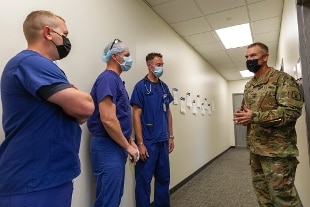In the US, the Delta is scary: 6 thousand deaths in 4 days and a boom in pediatric hospitalizations
US President Joe Biden will receive the third dose of the Covid vaccine
Covid, Fauci promotes Italy: "Better than the US, it has become an example in the world"
Share
September 17, 2021 Dizzying numbers, which are scary. In the United States, the total death toll from Covid-19 has exceeded 670 thousand: this is what emerges from the counts of Johns Hopkins University. According to the American university, 670,009 people have died in the country since the beginning of the pandemic, against a total of 41,785,979 confirmed infections. The US is the country with the highest number of coronavirus cases and victims in absolute terms.
And the daily numbers continue to scare: only yesterday 157,957 new cases and 2,293 deaths. Most of the infections concern young and very young people. And the majority of the victims are unvaccinated or with incomplete vaccination.
Precisely for this reason the US government is pushing to expand the vaccination campaign as much as possible and also to inoculate a third dose of vaccine to those who have already had access to complete vaccination.
While it is certain that President Biden will soon receive a third dose in the next few hours in the US, experts from the Food and Drug Administration will meet to express their opinion on the universalization of the further recall strongly desired by the tenant of the White House. The question, however, in the stars and stripes academic world, is still controversial. The announcement made in August by the Biden administration on the implementation of a recall campaign that would be launched on September 20 for all Americans who had received their second dose eight months earlier in fact took many experts off guard, cautious about possible side effects that this additional dose could induce,and criticism at a time when many countries only had access to a very limited number of doses. The caution of the FDA is evident from a document published just in view of the scheduled meeting. "In general - the experts write - the data indicate that the anti-Covid vaccines authorized in the United States still confer protection against serious forms of Covid-19 and death". However, it should be emphasized that the recommendations of this committee are not binding, but it is very rare that they are not followed.However, it should be emphasized that the recommendations of this committee are not binding, but it is very rare that they are not followed.However, it should be emphasized that the recommendations of this committee are not binding, but it is very rare that they are not followed.
Any form of distrust that the FDA could express would, however, sound like a blame aimed at the Biden administration, which has announced that it wants to revaccinate all Americans before even consulting scientific agencies. Moreover, the President's push on the accelerator appears more than understandable given the still very strong impact of the epidemic on American territory.
For their part, however, many of the experts who hold back on the use of the third dose underline that the data on infections and deaths, although worrying, now mostly concern those who are part of the vast pool of non-immunized people, who still count in the US more than 65 million people. Two senior officials of the US Medicines Agency have therefore already placed their names on a letter published in The Lancet against a third dose "at this stage of the pandemic".
In any case, if these experts vote in favor of a booster dose for Americans, it will then be up to another committee, led by the main United States Federal Health Agency (CDC), to decide who should receive the third time. vaccine. The CDC will meet on Sept. 22-23 and has however already established that adults over the age of 65, nursing home residents and health care workers should be given priority.
For its part, to convince of the need for this additional dose, Pfizer plans to throw on the scales a series of studies that photograph the reduced protection against infections that occurs a few months after the administration of the first two doses. However, a growing number of American studies show that two doses would be sufficient to confer high protection against the serious consequences of the disease, albeit at slightly lower levels in the elderly. In short, the debate is open even if, given the speed with which the Delta variant continues to spread both in the US and in the rest of the world, it can only be concluded in a short time.

